#the grand imperial wedding of the guangxu emperor
Photo

The Grand Imperial Wedding of the Guangxu Emperor, Qing Kuan and Court Painters, 1889
#the grand imperial wedding of the guangxu emperor#Qing kuan#court painters#painting#art#1889#1880s#1800s#19th century#wedding
9 notes
·
View notes
Note
do you know what weddings were like for princes and princesses in the qing dynasty?
Most of this is based on information about Emperor Guangxu’s wedding to Empress Longyu. Obviously the emperor’s wedding is a lot more elaborate, but weddings of princes and princesses should be somewhat the same.
Sources: 1, 2, also Vietnamese book: Những người đàn bà của hoàng đế, Hướng Tư (2003), NXB Văn hóa – Thông tin
Normal people’s weddings during the Qing dynasty would consist of the following six ceremonies:
Proposal 纳采 nacai
Asking for the bride’s name and birthday 问名 wenming
Visit the fortune teller (to ensure that bride and groom’s birthdates are compatible 纳吉 naji
Prepare and send wedding gifts 纳征 nazheng
Choosing a ceremony date 请期 qingqi
Wedding ceremony 亲迎 qinying
For the emperor, this is reduced down to basically :
nacai
nazheng (for the emperor, it is called dazheng 大征, because the emperor’s marriage is referred to as the “great marriage” 大婚 dahun)
wedding ceremony combined with the investiture of the empress (in the cases of Shunzhi, Kangxi, Tongzhi, Guangxu who came to the throne before they were married)
(The whole things to do with asking for the birthdate and checking whether it’s compatible is pretty redundant considering if you are chosen to marry the emperor, you have already gone through the xiunv selection process which is pretty much the same thing.)
Timeline for Guangxu’s marriage:
2nd day 11th month 14th year of Guangxu era: proposal (nacai)
4th day 12th month 14th year: sending wedding gift (dazheng)
26th day 1st month 15th year: announce the betrothal to Heaven and Earth and the ancestral shrines
27th day 1st month 15th year: the empress enters the palace (fengying 凤迎, 凤 phoenix refers to the empress), investiture of the empress and wedding ceremony
2nd day 2nd month 15th year: ceremony of the empress paying respects to Empress Dowager Cixi (chaojian 朝见)
In normal weddings, the groom and/or his parents would present the betrothal/wedding gifts to the bride’s family himself, and then on the wedding day, the groom would go to the bride’s home to pick her up. However, as the emperor is considered too high and mighty to do any of that himself, for all these ceremonies, he would appoint several representatives consisting of one main commissioner (正使 zhengshi) and at least one deputy commissioner (副使 fushi) to carry out these tasks for him. These commissioners would be chosen among the princes or high-ranking officials close to the emperor.
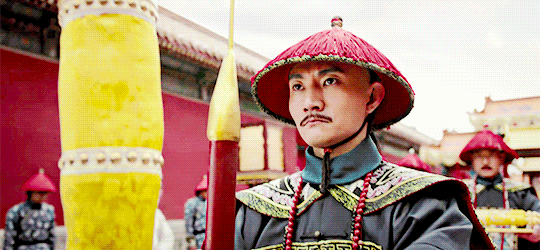
Legend of Ruyi: Fu Heng being the zhengshi at Qian Long’s wedding to Ruyi, because nothing says fuck you true love like getting the brother of your dead first wife to be your proxy at the wedding to your second wife, whom your first wife hated and spent her last breaths more or less cursing. No wonder Fu Heng looks so happy.
(This appointment was historically accurate, but considering Langhua and Ruyi's relationship in this drama, this is such an asshole move. Fu Heng was the zhengshi at the investiture of the Step Empress into the position of Imperial Noble Consort as well.)
Nacai (proposal)
During the proposal ceremony, the commissioners will present betrothal gifts to the bride’s family. For Guangxu’s marriage, betrothal gifts consisted of four horses with saddles; ten suits of armour; one hundred bolts of brocade in yellow, red, orange, indigo, blue; and two hundred bolts of fabric, along with gold and silver household items. The horses and armour represent the Manchurian history of conquering China through martial prowess.
Afterwards, an engagement banquet is held at the bride’s house, prepared by the Imperial Tea Kitchen of the palace and at the expense of the imperial palace as a thank you to the bride’s family for raising her.
Dazheng (sending wedding gifts)
Wedding gifts will consist of gifts to members of the bride’s family, as well as items for the bride’s use after marriage. There is so much of it, tl;dr: they stupidly rich, Mr Darcy got nothing on them.
If you can read Vietnamese, here is the list of wedding gifts given for Guangxu’s wedding. This goes on for literally three more pages. I’m not translating it because my eyes glazes over every third line of jade descriptions.
Wedding and investiture of empress
On the wedding day, the emperor’s commissioners would take the emperor’s proclamation to create the empress, along with the empress’ golden book (金册) and golden seal (金宝), the physical manifestations of the empress’ power, to present to the bride.
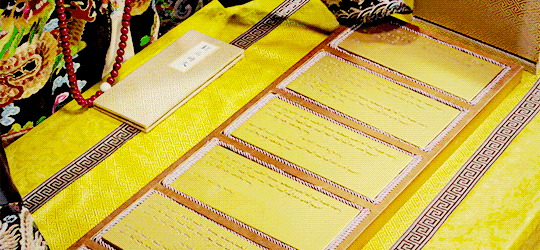
Empress's golden book 金册 in Legend of Ruyi
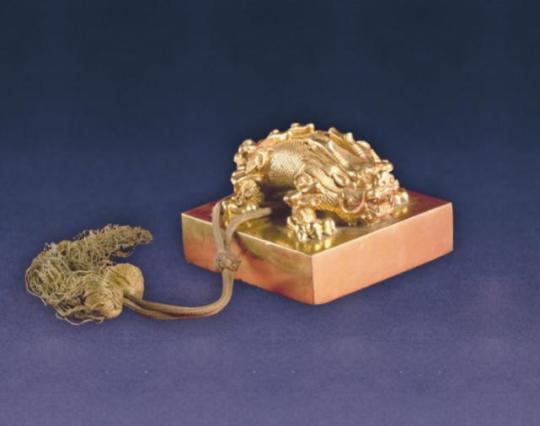
Empress's golden seal 金宝 from the Palace Museum
The bride then will be brought into the palace on a golden palanquin (called 凤舆 fengyu) through the middle gate of the Meridian Gate into the palace.
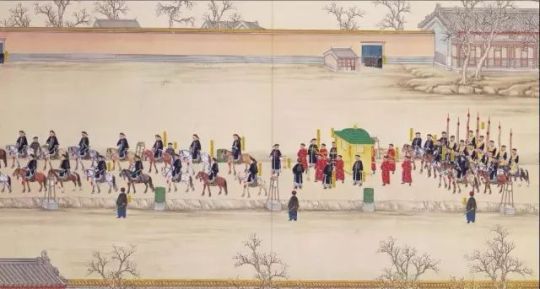
Painting of Emperor Guangxu's wedding 光绪皇帝大婚图
During the journey, the bride would carry a ruyi scepter and an apple, both representing auspiciousness and peace.
Ruyi scepters were essential in imperial weddings. During the Qing dynasty, four emperors were married in the Forbidden City after their enthronement. Their weddings were luxurious spectacles and had fixed rituals. The Qing Palace Archives record the following:
On the eve of the wedding, the Grand Minister in Command of the Guard, Commissioner of the Imperial Procession Guard and their entourage carried the empress's sedan from the middle of the Gate of Heavenly Purity (Qianqing men) and placed it in the Palace of Heavenly Purity (Qianqing gong). Dispatched to receive the bride were four court ladies of high rank dressed in red were commanded to place inside the sedan chair a ruyi scepter and a scroll with the character for dragon (long) written by the emperor. Then these ladies as well as some female attendants of the Imperial Household Department prepared the bridal chamber and the bridal bed called "dragon and phoenix bed". The four ladies also set four ruyi scepters on the bed, one at each corner.
During the wedding, officials presented their gifts which all included a pair of ruyi scepters. They were also included in princesses' dowry. The Qianlong Emperor gave his daughter Hexiao Princess a set of nine pieces, and her husband a Ruyi with turquoise inlay. (x)
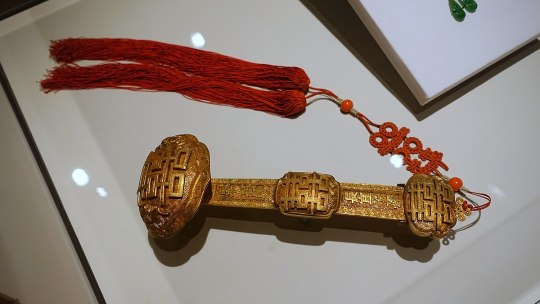
ruyi scepter
Apple is pingguo 苹果 which sounds the same as ping as in pingan 平安 (peaceful).
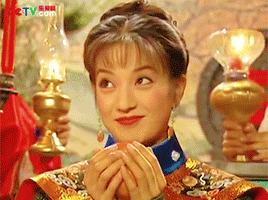
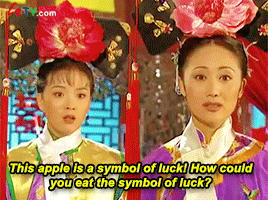
(full post)
Once reaching the steps of Qian Qing Gong (Palace of Heavenly Purity, the seat of the emperor), the bride will hand over the ruyi and apple, and then hold a golden jar (ping) and step over a brazier of coals, signalling burning away any bad luck.
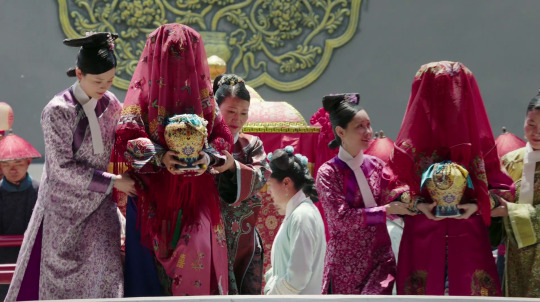
Ruyi and Xiyue carrying jars (ping) as a symbol of luck on their wedding day
From Qian Qing Gong she makes her way to Kun Ning Gong (Palace of Earthly Tranquility), which is traditionally the seat of the empress of the Ming and Qing dynasties and were all weddings of emperors took place. Before entering Kun Ning Gong, she would also need to step over a horse saddle - 鞍, pronounced an, as in pingan 平安.
Not mentioned in the description of Guangxu’s wedding, but there is also another ritual where the groom would shoot three arrows at a target as a symbol of luck.
Qing dynasty royal weddings take place at night. During Guangxu’s wedding, Empress Longyu entered the her bridal sedan chair and departed her home at around 11:45pm, and reached the palace at around 4:45am, because walking ¯\_(ツ)_/¯
Hejin 合卺
Hejin is the ceremony after the bride enters the bridal chamber, and the bride and groom drink a cup of wine together and share a meal, signalling the start of their married life.
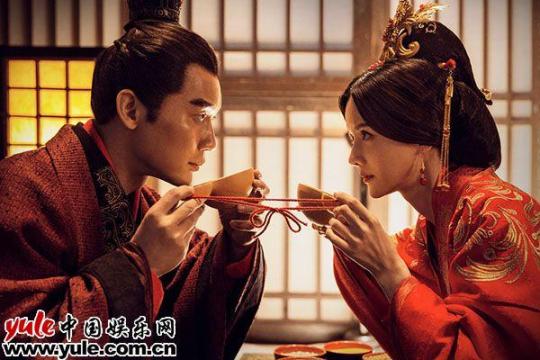
卺 originally refers to splitting a hulu gourd in half, and 合卺 means to bring the two halves together, which is why in earlier dynasties you will see couples drinking their wedding wine out of two halves of a hulu gourd.
Afterwards there would also be a banquet at Taihe Dian (Hall of Supreme Harmony).
Chaojian 朝见
Normally the day after the wedding, the bride would pay respects to her in-laws by going to greet them, serve them tea and wine. With Guangxu’s wedding, this ceremony didn’t happen until several days later because they needed to wait for an auspicious day™.
See also:
Attend The Grand Wedding of the Guangxu Emperor
The Grand Wedding of China's Last Emperor
#ask#reference#wedding#qing dynasty#culture#etiquette#legend of ruyi#this is an extremely abridged description#but hopefully you get the idea#there are tons of other ceremonies around the investiture of an empress#but seriously just watch ruyi for that#it's probably a good enough representation
78 notes
·
View notes